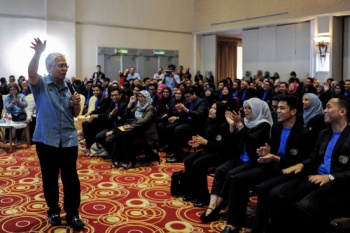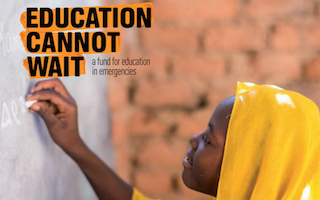By CLADE
462 million school-aged children – or one in four around the world – live in countries affected by crisis. 75 million are either in danger of, or are already, missing out on their right to a free, quality education. Education empowers and promotes resilience, provides a safe space and stability, is fundamental for children, youth and adults to tackle emergencies, and breaks the cycle of conflict.
Supporting children and young people living in some of the world’s most difficult contexts has proven to be a serious challenge: in 2015, only 12% of children identified as living in conflict situations were reached by humanitarian funding dedicated to education. Efforts must be redoubled if the world is to meet its shared ambition to leave no one behind.
As such, the Global Campaign for Education welcomes the launch of the Education Cannot Wait fund for education in emergencies, which was announced at the World Humanitarian Summit in Istanbul, Turkey, 23-24 May 2016. The fund aims to reach more than 13.6 million children and young people living in crisis situations, such as conflict, natural disasters and disease outbreaks, with quality education over the next five years, and 75 million by 2030. GCE believes that the new fund constitutes an historic opportunity to fund the future by ensuring access to quality education for some of the world’s most vulnerable children and young people.
The European Union, the Netherlands, Norway, the United Kingdom, and the United States have all made financial contributions for the first year of the fund so far, with Denmark indicating its willingness to make a financial contribution in 2017. The fund’s target for the first year is US$150 million, with an overall ambition of achieving $3.5 billion over a five-year period; by the close of the World Humanitarian Summit, just over 50% of the year one target had been pledged.
GCE welcomes these pledges and will be holding governments to account by analysing these commitments in the coming days. It is crucial to ensure that new monies have been pledged, and that countries supporting the new Fund do not double-count commitments, such as those made during the February 2016 Syria Conference, or draw back their support from existing mechanisms, such as the Global Partnership for Education.
Similarly, GCE urges those governments making pledges to the new fund to commit to delivering the vision of equitable, inclusive and free quality education to which they have pledged for every child in the Sustainable Development Goals (SDGs) and the Education 2030 Framework for Action; all children, young people and adults have the same rights, and these rights should not be compromised for those living in crisis contexts. We particularly call on governments to ensure that public funds dedicated to education are used for quality, public provision and systems, and not to support for-profit private companies seeking to draw financial profit from humanitarian crises. This practice, known as ‘disaster capitalism’, has already been applied in several cases and contexts, and has proven to be profoundly detrimental to the realisation of human rights. For the right to education, it places quality, equity, and inclusion in serious jeopardy.
GCE also welcomes the fund’s commitment to being inclusive and transparent in its own governance. We call on the fund to adhere to the principle of engaging with and including civil society, both in its own governance arrangements and in its ways of working on the ground. The voice of citizens is vital to ensuring that its work is well-informed, and held accountable by those it seeks to serve.
GCE submitted its own pledge to the World Humanitarian Summit. The pledge encompassed building civil society capacity in countries afflicted by disaster and conflict to ensure citizens are involved in sector planning in and for such contexts, as well as monitoring education financing and delivery. At local, national, regional and international levels, GCE is also committed to advocating for increased and additional resources for education in emergencies and crises, and monitoring such commitments and delivery of services.
The statement above can be downloaded in English.
Source:
http://www.campaignforeducation.org/en/news/global/view/679-education-cannot-wait-a-fund-for-education-in-emergencies-statement-by-the-global-campaign-for-education









 Users Today : 13
Users Today : 13 Total Users : 35460276
Total Users : 35460276 Views Today : 16
Views Today : 16 Total views : 3418984
Total views : 3418984